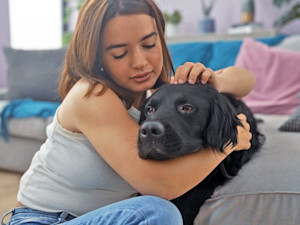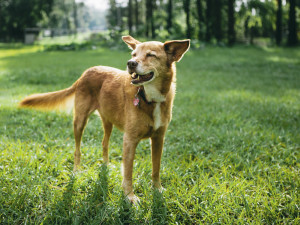How to Soothe a Dog’s Cough—Home Remedies and Safe Medications
Thankfully, there are ways to help them.

Share Article
In This Article:
When to Treat At Home vs. Seek Medical Care How to Soothe Your Cog’s Coughing and Gagging How to Treat Coughing In Your Dog Cough Medications Safe for Dogs
No dog wants to be kept up all night with a hacking cough, and no pet parent wants to lose sleep worrying about what’s causing it. Figuring out the cause of your dog’s cough can be left up to your vet, but is there anything you can do to help soothe your dog’s throat and get everyone in the house some rest? Let’s look into some dog cough remedies that aim to resolve the irritation and inflammation that cause coughing.
When to treat at home vs. seek medical care
Pet parents always face a tough decision when their dogs start to show any new symptoms or abnormal behavior: do I have to go to the vet for this or can I wait it out? A coughing dog makes this question complex due to the many possible causes of cough, including:

Throat irritation
Allergies
Foreign objects
Upper respiratory infections
Chronic bronchitis
Pneumonia
Tracheal collapse
Parasites
Cancer
It’s always best to check in with your vet’s office if your dog is displaying any new symptoms. They’re the best people to guide you on what to watch for. In general, if your dog is having a cough with an obvious cause (drinking water too fast, getting a faceful of smoke from a fire pit) and acting normally otherwise, it’s probably OK to wait and watch to make sure it resolves.
If your dog is having intermittent coughing without an obvious cause, it’s a good idea to get them checked out by your vet. Seek emergency veterinary care if your dog’s cough is constant or accompanied by difficulty breathing, lethargy, weakness, loss of appetite, or any other symptoms.
How to soothe your dog’s coughing and gagging
Working at emergency vet clinics, I often received phone calls in the middle of the night from concerned pet parents saying, “My dog hasn’t been able to sleep all night. He’s been shifting around constantly then standing up to cough. He’s still taking treats and drinking water, but he can’t seem to settle down without coughing. Is there anything I can do for him?”
Because it’s difficult to assess a dog’s health status over the phone, and there are many causes for coughing, I generally recommend that people concerned about their dog’s cough bring them in for evaluation. Figuring out the root cause of the cough allows appropriate treatment to be started, but there are still palliative options even for pet parents who just want to get their dog some relief for the night.
How to treat coughing in your dog
For many people dealing with dog coughing, treatment at home is preferred to going into the vet. While getting appropriate care is always ideal, there are some basic steps that can be taken at home to help soothe a mild cough:
Using humidifiers or steam to soothe the airways: Cold, dry air can worsen a cough. If you’re in a dry climate, consider using humidifiers in your dog’s living areas to help prevent their airways from drying out. Bring your dog to a small bathroom while a hot, steamy shower is running; that can also moisten airways and loosen up secretions.
Ensuring clean, dust-free living spaces: Inhaling dust and debris can cause throat irritation and trigger coughing. Keep your living area clean and try to limit the ways dust and dirt can enter your house. Vacuuming and sweeping can kick up a lot of dust, so keep your coughing dog out of the room while you’re cleaning.
Avoiding irritants like cigarette smoke: Secondhand smoke is a respiratory irritant and can trigger coughing in dogs just like it does in people. If you smoke, don’t do it indoors and leave your dog inside when you go out for a smoke. This goes for cannabis too.
Ensuring adequate rest and hydration: Good rest and appropriate hydration are key to recovery from illnesses. Coughing dogs often have trouble getting quality sleep due to their coughing and throat irritation. Finding ways to suppress the cough is important for your dog’s comfort as they recover.
Natural cough suppressants and herbal remedies
Online searches pull up many natural dog cough suppressants available from pet stores. These products often contain ingredients like:
Honey, which is often included for its antibacterial, anti-inflammatory, and coating properties.
Slippery elm, which contains mucilage, a gel-like substance that can coat mucous membranes.
Marshmallow root, which is used for its effects as a demulcent, relieving mucous membrane irritation by coating their surface.
Thyme, which has expectorant properties and is mildly antimicrobial.
Licorice root, which has anti-inflammatory effects in addition to being a demulcent.
Ginger, which can act as an expectorant.
These ingredients do not have scientific evidence supporting their use to improve coughing in dogs. Some ingredients have been shown to improve coughing in people though. Most cough supplements found in pet stores do not give concentrations for the ingredients listed on their labels (if they’re listed at all), making it difficult to know the appropriate dosage.
In general, the “natural” supplement product category has quality control issues: because these products are poorly regulated, they often do not contain the ingredients they claim to. Although some dogs may benefit from products containing these ingredients, these problems make it difficult to recommend their use from online sources.
Cough medications safe for dogs
So, what do veterinarians usually recommend for coughing dogs? That depends on the cause of the cough. For example, a dog with pneumonia may need antibiotics and an expectorant, which helps to loosen up mucus so it can be coughed up. But cough suppressants may not be ideal for dogs with pneumonia because the cough helps to bring up the mucus and debris from deep in the lungs. Figuring out the right combination of medications to treat your dog’s cough is a big part of getting your dog to feel better.
Some common medications used to treat cough include:
Cough suppressants
The most effective dog cough medicines tend to be narcotics. These drugs act directly on the cough center in the brain to reduce the urge to cough. This class of drugs can cause sedation and constipation, but the doses used for cough suppression are generally low enough that this is not an issue. Narcotic and narcotic-like medications used for cough in dogs include:
Hydrocodone: This is commonly prescribed as a tablet or liquid. It often contains homatropine, which can dry secretions, as well.
Butorphanol: This has become expensive and harder to find but can be an effective cough suppressant.
Dextromethorphan: This is the active ingredient in many human cough syrups, but is not very effective for most dogs. Dogs do not break this drug down into the active metabolite, so most of its effect is lost.
Antibiotics
Antibiotics are commonly used to treat coughs caused by pneumonia or upper respiratory infections (kennel cough). They’re not always necessary in treating a cough, even when it’s potentially spread from another dog.
Doxycycline: Treats many bacteria that cause respiratory diseases. Used with caution in young puppies due to potential effects on the enamel of their teeth.
Amoxicillin: Common first-line antibiotic for pneumonia. Often combined with other agents to strengthen its activity against resistant bacteria.
Enrofloxacin: May be used in combination with amoxicillin in more serious cases of pneumonia.
Expectorants
Drugs that thin secretions, promote mucus clearance, and facilitate productive coughing can help to resolve coughing related to pneumonia and other respiratory issues. The two drugs used most commonly for this are:
Guaifenesin
N-acetylcysteine
Bronchodilators
Bronchodilators are not used as commonly for coughing in dogs as they are in people or cats. This is because there are differences in the type of muscles in the lower airways between species. Some dogs with chronic bronchitis or collapsing trachea may still benefit from bronchodilators like:
Theophylline
Terbutaline
Vaccinations
While they don’t treat active coughing, vaccines are one of the best ways to prevent a cough in dogs. Vaccinations against coughing are started in puppies and come via boosters throughout a dog’s life. Vaccines are available for many common causes of cough in dogs, such as:
Bordetella
Canine parainfluenza virus
Canine adenovirus Type 2
Canine distemper virus
Canine influenza virus
Canine respiratory coronavirus
Canine herpesvirus-1
Bottom line
Seeing your dog coughing can be upsetting, but there are treatments available to calm the cough. Although there are over-the-counter herbal supplements sold to treat coughing in dogs, these products have not been proven to be effective. Work with your veterinarian to figure out the cause of the cough and identify the right medications to treat that cause.
References
Aoki, Takuam et al. “Comparative study of the effects of antitussive drugs in a canine acute cough model.” Veterinary Medicine and Science vol 10,5 (2024). doi:10.1002/vms3.1549opens in new tab.
Knueven, Douglas. “Botanical Medicine: Mother Nature's Drugs.” Wild West Veterinary Conference 2017.
Murgia, Vitalia et al. “Upper Respiratory Tract Infection-Associated Acute Cough and the Urge to Cough: New Insights for Clinical Practice.” Pediatric allergy, immunology, and pulmonology vol. 33,1 (2020): 3-11. doi:10.1089/ped.2019.1135opens in new tab.
Oduwole, Olabisi et al. “Honey for acute cough in children.” The Cochrane database of systematic reviews vol. 4,4 CD007094. 10 Apr. 2018, doi:10.1002/14651858.CD007094.pub5opens in new tab.
Paul, Ian M et al. “Effect of honey, dextromethorphan, and no treatment on nocturnal cough and sleep quality for coughing children and their parents.” Archives of pediatrics & adolescent medicine vol. 161,12 (2007): 1140-6. doi:10.1001/archpedi.161.12.1140opens in new tab.
Ziment, Irwin. “Herbal antitussives.” Pulmonary Pharmacology & Therapeutics vol. 15,3 (2002): 327-33. doi:10.1006/pupt.2002.0343opens in new tab.

Dr. Bartley Harrison, DVM
Dr. Bartley Harrison is a veterinarian with more than 19 years of experience. He has treated a variety of species in emergency and speciality practices for both large and small animals. His primary interests as a vet are emergency medicine and critical care.
Related articles
![Large brown dog sick and coughing.]()
Why Is My Dog Coughing? 11 Reasons Why and What to Do
From toxins to allergies, let’s get down to business and problem-solve this.
Why Does My Dog Cough After Drinking Water?
An expert weighs in on when it’s totally fine, and when you should start to worry.
![Woman cuddling her sick black dog at home.]()
Diagnosing Kennel Cough in Dogs: A Comprehensive Guide
When to call the vet.
![A dog coughing]()
Is Kennel Cough Contagious?
What you need to know about this super contagious disease. (Hint: There’s a vaccine.)
Why is My Dog Coughing and Gagging?
Let’s figure out this unsettling mystery.
![A dog outside with his mouth open coughing]()
Respiratory Illnesses in Dogs: 6 Serious Conditions Related to Coughing in Dogs
Vet advice on when you should be worried.







